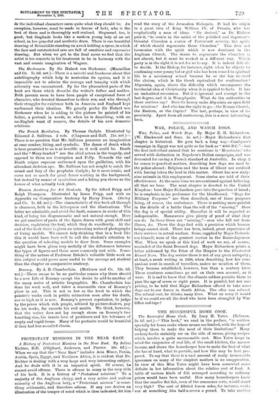WAR, POLICE, AND WATCH DOGS.
War, Police, and Watch Dogs. By Major E. H. Richardson. (W. Blackwood and Sons. 5s. net.)—Major Richardson's first chapter is historical. He goes back a long way—Cambyses's campaign in Egypt was not quite as far back as "4000 B.C."—but the first individual animal that he mentions is 'Moustache,' who served with distinction in Napoleon's Italian campaigns, and was decorated for saving a French standard at Austerlitz. In chap. 2 he comes to practical matters, describing how dogs are used by the police abroad: Belgium and the town of Ghent are credited with having taken the lead in this matter. Ghent has now sixty- nine animals in this employment. Some stories are told of their effectiveness. At the same time we are cautioned against believing all that we hear. The next chapter is devoted to the United Kingdom : here Major Richardson goes into the question of breed ; he is emphatic in his preference for the bloodhound. "Dogs for Military Purposes" are then described, one of these purposes being, of course, the ambulance. There is nothing more painful in the details of a battle than the roll of the "missing." Hero the dog is of special utility. Hereafter it will ho regarded as indispensable. Manceuvres give plenty of proof of what they can do. In these there are "missing,"—men who fall out from illness, ite. These the dogs find with a precision which human beings cannot rival. There has been, indeed, great experience of their services in actual warfare. Some, supplied by Major Richard- son himself, were of the greatest service in the Russo-Japanese War. When we speak of this kind of work we are, of course, reminded of the Saint Bernard dogs. Major Richardson prints a letter addressed by the Prior of the Hospice to the Illustrated Kennel News. The dog service there is not of any great antiquity ; at least, a monk writing in 1698, when describing how his com- panions went in search of travellers, makes no mention of them. They became established, however, less than a century later. These creatures sometimes go out on their own account, as it were. It is sad to know that the climate seldom permits them to pass the age of seven or eight years. It is painful, but not sur- prising, to be told that Major Richardson offered to take some dogs out to our forces in South Africa. The offer was refused. The refusal cost, he thinks, many lives. What an army it would be if we could see all the dead who have been strangled by War Office red-tape !


































































 Previous page
Previous page